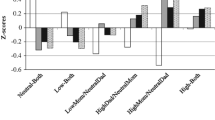Abstract
From junior high school on, girls report lower estimations of their math ability and express more negative attitudes about math than do boys, despite equivalent performance in grades. Parents show this same sex-typed bias. This paper examines the role that attributions may play in explaining these sex differences in parents' perceptions of their children's math ability. Mothers and fathers of 48 junior high school boys and girls of high, average, and low math ability completed questionnaires about their perceptions of their child's ability and effort in math, and their causal attributions for their child's successful and unsuccessful math performances. Parents' math-related perceptions and attributions varied with their child's level of math ability and gender. Parents credited daughters with more effort than sons, and sons with more talent than daughters for successful math performances. These attributional patterns predicted sex-linked variations in parents' ratings of their child's effort and talent. No sex of child effects emerged for failure attributions; instead, lack of effort was seen as the most important, and lack of ability as the least important, cause of unsuccessful math performances for both boys and girls. Implications of these attributions for parents' influence on children's developing self-concept of math ability, future expectancies, and subsequent achievement behaviors are discussed.
Similar content being viewed by others
References
Armstrong, J. M. Achievement and participation of women in mathematics: An overview. (Report No. 10-MA-00). Denver, CO; National Assessment of Educational Progress, 1980. (ERIC Document Reproduction Service No. ED 184 878).
Covington, M. V. The motive for self-worth. In R. E. Ames & C. Ames (Eds.), Research on motivation in education, vol. 1, student motivation. Orlando, FL: Academic Press, 1984.
Covington, M. V., & Beery, R. G. Self-worth and school learning. New York: Holt, Rinehart and Winston, 1976.
Eccles, J. E., Adler, T. F., & Meece, J. L. Sex differences in achievement: A test of alternate theories. Journal of Personality and Social Psychology, 1984, 46, 26–43.
Eccles, J. E., Adler, T. F., Futterman, R., Goff, S. B., Kaczala, C. K., Meece, J. L., & Midgley, C. Expectancies, values, and academic behaviors. In J. T. Spence (Ed.), Perspectives on achievement and achievement motivation. San Francisco: Freeman, 1983.
Eccles-Parsons, J. S., Adler, T. F., & Kaczla, C. M. Socialization of achievement attitudes and beliefs: Parental influences. Child Development, 1982, 53, 310–321.
Ernest, J. Mathematics and sex. Santa Barbara, CA: University of California Press, 1976.
Fennema, E. Mathematics learning and the sexes: A review. Journal for Research in Mathematics Education, 1974, 126–139.
Fennema, E., & Sherman, J. Sex-related differences in mathematics achievement, spatial visualization, and affective factors. American Educational Research Journal, 1977, 14, 51–71.
Frieze, I. H., Fisher, J., Hanusa, B., McHugh, M., & Valle, V. Attributing the causes of success and failure: Internal and external barriers to achievement in women. In J. Sherman & F. Denmark (Eds.), Psychology of women: Future directions of research. New York: Psychological Dimensions, 1978.
Hess, R. D., Holloway, S., & King, D. R. Causal explanations for low and high performance in school: Some contrasts between parents and children. Paper presented at the biennial meeting of the Society for Research in Child Development, Boston, 1981.
Hilton, T. L., & Berglund, G. W. Sex differences in mathematics achievement: A longitudinal study. Journal of Educational Research, 1974, 67, 231–237.
Holloway, S., Hess, R. D., & King, D. R. Mother's and children's explanations for school performance: Relation to academic achievement. Paper presented at annual meeting of the American Educational Research Association, Los Angeles, 1981.
King, D., Hess, R., & Holloway, S. A study of mothers and children's causal attributions about children's performance in school subjects. Paper presented at the annual meeting of the American Educational Research Association, Los Angeles, 1981.
Nicholls, J. G. Conceptions of ability and achievement motivation. In R. E. Ames & C. Ames (Eds.), Research on motivation in education, vol. 1, student motivation. Orlando, FL: Academic Press, 1984.
Weiner, B., Nirenberg, R., & Goldstein, M. (1976). Social learning (locus of control) versus attributional (causal stability) interpretation of expectancy of success. Journal of Personality, 1976, 44, 52–68.
Weiner, B., Frieze, I., Kukla, A., Reed, L., Rest, S., & Rosenbaum, R. Perceiving the causes of success and failure. In E. E. Jones (Ed.), Attribution: Perceiving the causes of behavior. New York: General Learning Press, 1971.
Wilhelm, S., & Brooks, D. M. The relationship between pupil attitudes toward math and parental attitudes toward math. Educational Research Quarterly, 1980, 5, 8–16.
Author information
Authors and Affiliations
Additional information
This paper is based on a master's thesis by the first author. This research was funded by grants to Jacquelynne S. Eccles from the following agencies: the Foundation for Child Development, the National Institute of Mental Health, and the National Institute of Child Health and Development.
We wish to express our thanks to Linda Buford, Sandra Hamman, and Samuel D. Miller, who helped collect and code these data, and especially to the parents, students, and teachers in the Ann Arbor Public School district, whose cooperation made this project possible.
Rights and permissions
About this article
Cite this article
Yee, D.K., Eccles, J.S. Parent perceptions and attributions for children's math achievement. Sex Roles 19, 317–333 (1988). https://doi.org/10.1007/BF00289840
Issue Date:
DOI: https://doi.org/10.1007/BF00289840



